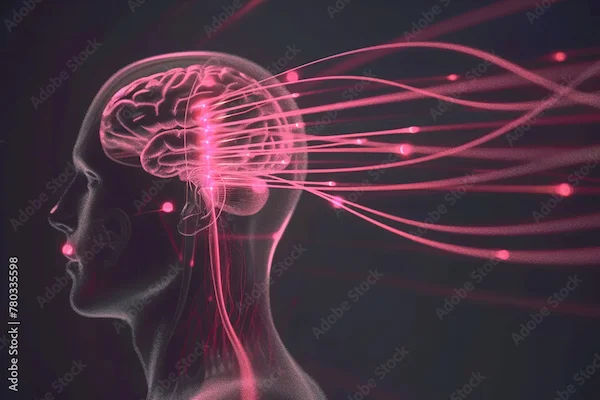Understanding The Brain's Role In Reflex Actions
Learn how the brain and spinal cord coordinate reflex actions. Understand the neural pathways involved, their speed, and the importance of reflexes in protecting the body from harm.

Written by Dr. Siri Nallapu
Reviewed by Dr. Dhankecha Mayank Dineshbhai MBBS
Last updated on 24th Jul, 2025

Have you ever wondered why you pull your hand away instantly when you touch something hot? Or why your leg jerks when the doctor taps your knee with a small hammer? These quick, automatic responses are called reflex actions, and they play a crucial role in protecting our bodies from harm. But how exactly does the brain contribute to these rapid reactions? Let’s explore this fascinating process in a simple and friendly way.
What Are Reflex Actions?
Reflex actions are involuntary, automatic responses to certain stimuli (like heat, pain, or sudden touch). They happen so fast that you don’t even have time to think about them! Some common examples include:
Pulling your hand away from a hot object
Blinking when something comes near your eye
Sneezing when dust enters your nose
Knee-jerk reaction during a doctor’s check-up
These reflexes help prevent injuries and keep us safe.
How Does the Brain Play a Role?
While many reflex actions are controlled by the spinal cord (without needing the brain’s input), the brain still has an important role in processing and fine-tuning these responses. Here’s how it works:
1. Immediate Response (Spinal Reflex Arc): When you touch something hot, sensory nerves in your skin send a lightning-fast signal to your spinal cord. The spinal cord instantly sends a signal back to your muscles, telling them to move your hand away. This happens in milliseconds—before the brain even gets the message!
2. Brain’s Role in Perception: After the reflex action occurs, the brain gets the signal and helps you understand what happened. The brain also helps you learn from the experience, so you’re more careful next time.
3. Modifying Reflexes: Some reflexes, like blinking, can be controlled to some extent by the brain. For instance, if you try hard, you might resist blinking when something comes near your eye.
Why Are Reflexes Important for Health?
Reflex actions are essential for survival because they:
Protect us from danger by withdrawing from heat or sharp objects.
Help maintain balance by adjusting posture when you slip.
Ensure smooth body functions through digestion or breathing.
If reflexes are too slow or absent, it could indicate nerve or brain-related issues, such as:
Nerve damage (from diabetes or injuries)
Neurological disorders (like multiple sclerosis)
Spinal cord injuries
How Can You Keep Your Reflexes Healthy?
While reflexes are mostly automatic, you can support your nervous system with these healthy habits:
Stay Active: Regular exercise improves nerve function and coordination.
Eat a Balanced Diet: Nutrients like B vitamins (found in whole grains, eggs, and nuts) support nerve health.
Get Enough Sleep: Proper rest helps the brain and nerves function optimally.
Stay Hydrated: Dehydration can slow down nerve signals.
Avoid Alcohol & Smoking: These can damage nerves over time.
Consult Top Specialists For More Tips
When Should You See a Doctor?
Most reflex actions are normal, but consult a doctor if you notice:
Slowed or absent reflexes
Frequent tripping or clumsiness
Numbness or tingling in limbs
Muscle weakness
If you're concerned about your reflexes or nerve health, you can book a consultation with a neurologist through Apollo 24|7 for expert advice.
Conclusion
Reflex actions are amazing examples of how our body protects itself without conscious effort. While the spinal cord handles the quick responses, the brain helps us learn and adapt from these experiences. By keeping your nervous system healthy, you can ensure your reflexes stay sharp and protective.
Stay mindful of any unusual changes in your reflexes, and don’t hesitate to seek medical advice if needed. Your body’s quick reactions are a sign of a well-functioning nervous system—so take good care of it!
Would you like to learn more or discuss any concerns? Schedule a consultation today with Apollo 24|7’s expert neurologists for personalised guidance.
Consult Top Specialists
Consult Top Specialists For More Tips

Dr. Mohammed Huzef Ul Arifeen
General Practitioner
3 Years • MBBS
Hyderabad
Apollo 24|7 Clinic - Telangana, Hyderabad

Dr. Syed Yaseen Ahmed
General Practitioner
7 Years • MBBS
Hyderabad
Apollo 24|7 Clinic, Hyderabad

Dr. Shesham Srinidhi
General Practitioner
5 Years • MD(physician)
Hyderabad
Apollo 24|7 Clinic, Hyderabad
(100+ Patients)

Dr Summaiya Banu
General Practitioner
8 Years • MBBS
Hyderabad
Apollo 24|7 Clinic, Hyderabad
(150+ Patients)

Dr. Hrishikesh Shivakumar
General Physician/ Internal Medicine Specialist
9 Years • MBBS, MD
Bangalore
Apollo 24|7 Clinic - Karnataka, Bangalore
Consult Top Specialists

Dr. Mohammed Huzef Ul Arifeen
General Practitioner
3 Years • MBBS
Hyderabad
Apollo 24|7 Clinic - Telangana, Hyderabad

Dr. Syed Yaseen Ahmed
General Practitioner
7 Years • MBBS
Hyderabad
Apollo 24|7 Clinic, Hyderabad

Dr. Shesham Srinidhi
General Practitioner
5 Years • MD(physician)
Hyderabad
Apollo 24|7 Clinic, Hyderabad
(100+ Patients)

Dr Summaiya Banu
General Practitioner
8 Years • MBBS
Hyderabad
Apollo 24|7 Clinic, Hyderabad
(150+ Patients)

Dr. Hrishikesh Shivakumar
General Physician/ Internal Medicine Specialist
9 Years • MBBS, MD
Bangalore
Apollo 24|7 Clinic - Karnataka, Bangalore




